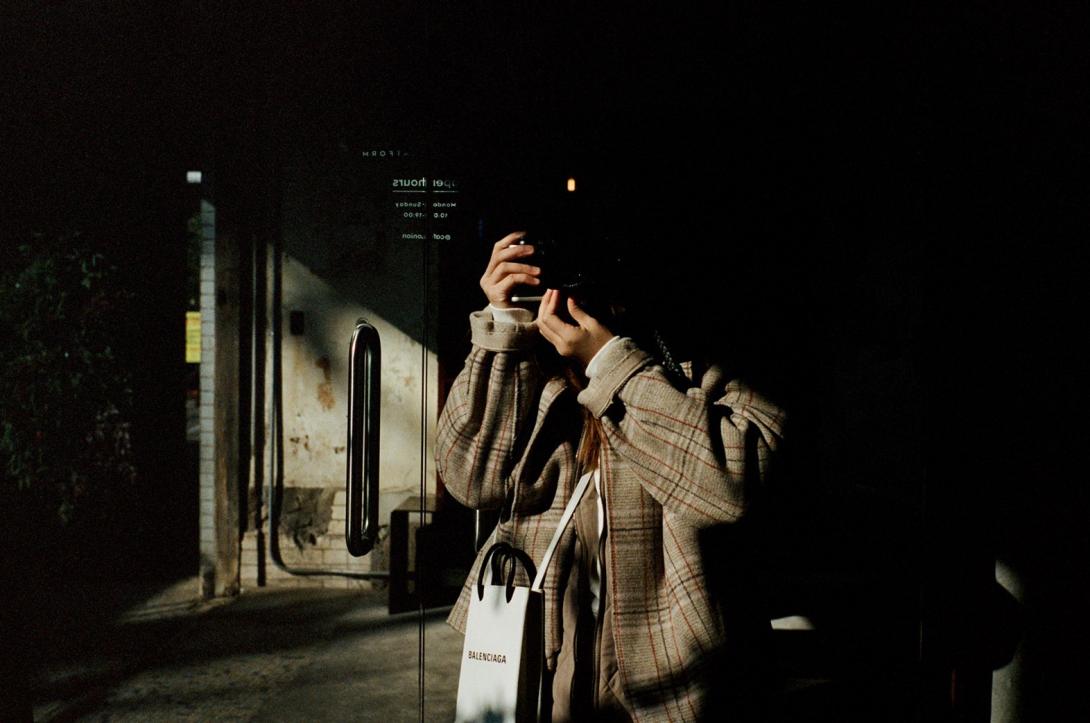Getting ready to register for the next term? Trying to put all the pieces together? Consider the benefit of exploratory course work and outside engagement opportunities. We know; sometimes, it doesn't seem like you're going to have enough time to fit everything in and get your degree on time. Trust us. You can. (Unless, maybe, you have dual majors, but sometimes there's still space, even then.) Here's what we've learned.
Pearl | Shaping How I See the World
Photos: Pearl Thianthai. Top right: Photographer stands in shadowed room, pointing their lens back at the photographer. Mid page: Photo of triangular skylight grid and sky beyond.
Outside of my major in architecture and minor in real estate development, two areas that have really shaped me are dance and photography — both inside and outside the classroom.
I’ve been dancing since I was three, but taking dance classes at U-M gave me a whole new perspective. Specifically, in Dance Composition (DANCE 131 & 132) class, it wasn’t just about technique, but about understanding movement in relation to space, rhythm, and even architecture. I loved exploring how the body interacts with its surroundings and how movement can influence the way we experience space. It made me think about design differently — not just as something visual, but as something physical and dynamic.
Photography has also been a huge creative outlet for me. I took an Entrepreneur Creativity class, which helped me grow my personal photography business, where I do commissions for headshots, graduation pictures, and street style photography. Working with clients taught me so much about capturing emotion, working with natural light, and understanding how people interact with their environment. It also pushed me to develop business skills like marketing, client management, and pricing — things that tie back to my interest in real estate and design. Michigan has also pushed my photography skills further by offering multiple photography competitions that I took part in, which I was able to express my stories through that.
Both dance and photography have shaped how I see and engage with the world. They’ve taught me about movement, perspective, and storytelling—things that, in many ways, connect back to architecture and design.
Pranavi | Leadership Isn't Always High Profile
One of the most significant growth opportunities I’ve had at U-M outside my major and minor programs has been my job as a Resource Navigator at the Michigan League. When I started, I assumed it would mainly involve helping visitors find their way around campus, but it quickly became much more than that. I found myself connecting students to important resources, whether it was academic support, financial aid guidance, or mental health services. This role placed me in a position where I could provide real help to students who, like many others, found navigating U-M’s many resources overwhelming.
One of the most rewarding aspects of this job has been seeing the direct impact of my work. Whether it’s helping a first-year student understand where to seek academic support or assisting an upperclassman in finding financial aid options, every interaction has taught me how valuable it is to have someone who can listen and offer guidance. I’ve learned how to communicate effectively, problem-solve on the spot, and approach every conversation with empathy. No two students have the same situation, so I’ve had to adapt my responses, think critically, and ensure that each person I assist leaves with useful information.
Beyond the technical skills I’ve developed, this experience has shaped the way I view leadership and support. I’ve realized that leadership isn’t always about being in a high-profile position—it can also mean being someone others can turn to in times of need. Working in this role has given me a new perspective on the importance of community and mutual support in a university setting.
This experience has also allowed me to grow personally by pushing me outside of my comfort zone. At first, I wasn’t sure if I had all the answers or if I’d be able to help every student who came to me. But over time, I gained confidence in my ability to find solutions, even when I didn’t have an immediate answer. I learned to trust myself and my ability to guide others, and that confidence has carried over into other areas of my life.
Editor's Note: Resource Navigator jobs are regularly posted to the U-M Student Employment website.
Rocco | Skills Following Me Into the Future
While I have grown a ton in my areas of study during my time at U-M, I can confidently say that I have expanded my base of knowledge and skills in many other areas as well. What pops out to me most, when I think about this, is my time spent in IGR which was truly transformative.
I was introduced to IGR--or Intergroup Relations--through somebody I work with and I decided to check it out. The description sounded like something I would be into; it was an opportunity to talk in a group setting about topical issues going on. Because I’ve always enjoyed reading up on the news, politics, the economy, and other related things, I decided to try it.
I entered the program and, during my first semester, I was able to do a lot of the things that I anticipated. I was able to hear opinions on issues from people with backgrounds completely different than mine, which was truly insightful. As the semester progressed, I decided that I thought that it would be a good opportunity to facilitate a classroom similar to the one I was in during my first semester. So, I signed up to facilitate a group dialogue class. The first couple of weeks of doing this, I was very nervous–I needed to be able to speak in front of a whole class constantly, figure out ways to keep conversations and dialogues on-topic and continually progressing, and, in general, I needed to know how to grade papers and manage a classroom. While tough in the beginning, I gradually settled in. By the end of the semester, I felt like a pro.
This experience was one of the most unique and stimulating things that I’ve done so far at U-M, and I know that the lessons that I learned–things regarding management, leadership, dialogue, listening--will follow me into whatever I decide to pursue.
Kathryn | Finding New Passions, While Staying Well-Rounded
Although my planned major is math, I absolutely adore subjects in history and law. I took HIST315 American Constitutional History last semester to satisfy my Race & Ethnicity (R&E) distribution requirement in LSA. The course revolved around certain primary topics, one being Citizenship and the reality of the role it’s played in societies. The course was lectured by Michigan Law School Professor Sam Erman, but they had a completely different style from the type I have become accustomed to.
On occasion, after the professor spoke (sometimes over an hour) they would suddenly insert questions posed to the students which were often met with awkwardness. These lectures were structured to elicit back-and-forth conversations, such as between Dr. Erman and peers, especially in trying to persuade opposing views or attempting to argue a perspective that they might otherwise disagree with. I imagine this style was carried over from the Law School, which I found to be so much more productive and effective than the standard approach. After some adjustment, the rest of the students were also very open and confident to make their cases, which was unfamiliar to me. I ended up loving that class and the subject matter so much that it’s the reason I’m minoring in history.
Additionally, this semester I am taking ENVIRON 376: Living Well With Nature to satisfy my Upper Level Writing Requirement (ULWR). Again, it’s very left-field of my degree but in a subject I thoroughly enjoy. Although this class satisfies the requirement, Program in the Environment Professor Rolf Bouma has structured the writing assignments so that they are applicable to different career fields--such as blog posts and annotated bibliographies with white papers– instead of intensively long academic papers. The expectations are still very high, no doubt. But, I appreciate this approach to the requirement as it encourages us, as students in the class, to execute versatility in our writing and adjust it to the type of audience who will be receiving our content. I have found taking this class and my history course from last semester also keeps me more well-rounded as the higher I get in math, the more involved it becomes.
Nicole | Learning Across Disciplines
While not specifically outside my masters program in the School of Social Work (healthcare field placement), the multidisciplinary SW714: Team-Based Clinical Decision-Making has been one of the best ways to continually learn about how to effectively work on interprofessional teams. The class combines students from the School of Medicine and Advanced-Practice Nursing, Dentistry, Pharmacy, and Social Work. Through clinical case discussions, simulations, and interprofessional discussions, the class aims at teaching students the importance of effective communication and team collaboration in clinical decision making.
Graduate students do not often get the opportunity to take classes across disciplines, so I have been grateful for the opportunity to learn from my peers in other disciplines and further explore questions our class has about clinical decision making from an interdisciplinary perspective. This class is also taught by faculty across the disciplines making the leadership and guidance from professors in the class even more informative. I have the pleasure of being led by a faculty member from the School of Nursing and Dentistry. My biggest takeaway from taking SW714 has been learning more about clinical knowledge and decision-making processes my peers use in their practice settings.
Ronen | Expand Your Perspective
In my first two years I shopped around a lot, looking at different courses, different majors and, because I was shopping, I took a lot of really great classes. I’m graduating with an Economics major and a minor in Environmental Studies, but that wasn’t always the plan. During my sophomore year, I wanted to do the PPE (Politics, Philosophy, Economics) major, which is offered by the College of Literature, Science and the Arts. Due to the major’s requirements, this meant that I had to take some courses in economics, political science, and philosophy before I could even apply. I also had to take Math 115, which was a pretty challenging prerequisite.
While I did not get accepted into the PPE major (it is very rigorous), I do not regret taking these prerequisite courses, in fact, I value them even more. Political science expanded my understanding of our government systems, which I could eventually tie directly into my Economics major since the government plays a large role in moving our economy. I also really valued philosophy which gave me more skills in critical thinking, as well as logical reasoning. Even Math 115 prepared me for the higher-level economics courses that I ended up taking which use a lot of calculus. Taking classes that aren’t a part of your major or minor track can be really valuable at U-M. Always look to expand your perspective with new and exciting courses.

